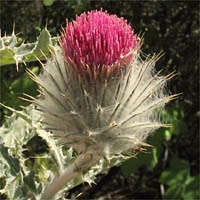
One is a thistle, not a cobweb. The Italian, the milk, the bull's eye and the sow do not merit the name. About the sow less said is better, and the rest are common, garish, poking up anywhere and without consideration, extravagantly spiked all up and down the stem as if they couldn't be squeezed by their necks at the root like anyone else and yanked out of the dirt. One does not waste resources on needless spines. One gathers in light and spins fine bristles over leaves and stems, with just a ruff of spikes around a bloom to guard the scions of the thistle line.
One is constituted, of course, for abstemiousness with water. Leaves must have a wax complexion, and they and the stem their down of hair to restrain the vapid dews from dissipation. This comes at a cost; the wax and hairs reflect the light. One is, at certain hours, radiant.
The bloom, in one's bright early weeks of life, is the nursery of the seeds, a noisy, busily metabolizing place, invaded now and then by the beaks of finches. A seed breaks out, or is pushed away in the final bloom-burst or may drop, I suppose, with the expiring flower. One flies off alone and drifts over sand, over rock, over silver lupine and tough coyote bush, and nowadays over dandelion, radish, fumaria, what not, until one drops. Drops and waits and waits until the rain comes.
Then the seeds of everything begin to burst and start their weeks of riotous growing. In the rainy months of life, of course, every pebble and sprouting grass overshadows one's small sprouting form. Sprouting cotlyedons everywhere, and then the leaves and runners and the climbing, pushing, spreading out to grasp the sun. One's leaves grow, one eats the carbon in the air and drinks, vibrant with expectation.
The bolt is thunderous. To bolt is to leap with every calorie of one's being at the sun. The bloom erupts then, come what may, and the winds and the insects carry off the pollen. Some bolt in the first year, unfortunates who were not taught patience or were too hard-pressed. They flower young and die. One hopes one's own seed will be wiser or more fortunate and wait a summer close to the ground, quietly absorbing all the abundant rain the winter brings and then, in the fullness of their prime, surge into a sturdy bolt and brilliant flower.
Late in summer the bloom grows full and noisy, crammed with popping seed and bees and beaks, and at one's feet the little mice are always feasting. The yellow finches come flapping loud but they bring quiet, plucking out the noisiest, most obstreperously ripe seeds every day, until at last even finches are not enough and the roar grows deafening and the airy seeds depart in puffs of silk.
The whole air fills with peace. One can hear again the roll of the waves and the rustle of distant neighbors. Now the vapors may stay or dissipate according to their wish. Now all the water may go. One needs only the bit of stem and leaf and bristle left to protect whatever seeds have fallen at one's feet. The remaining spikelets are enough to ward off the occasional scurry of dogs with their humans in tow, sniffing and licking and chewing. Let those untidy tongues so much as brush one's stem, and they regret it. One is, after all, a thistle.
HOME